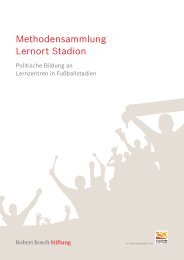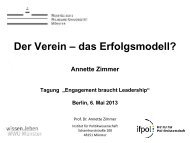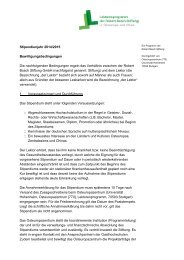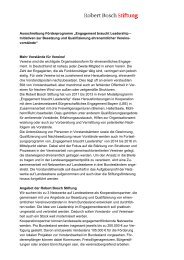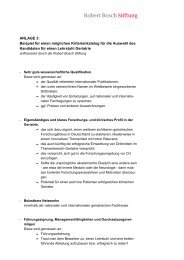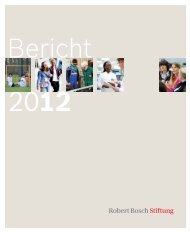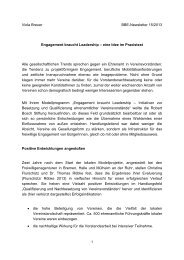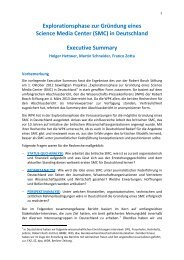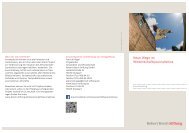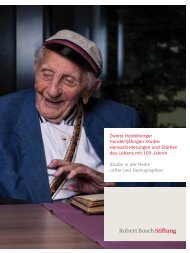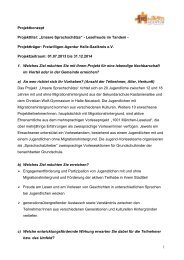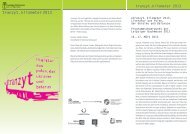Turkey, Its Neighbors and the West - Robert Bosch Stiftung
Turkey, Its Neighbors and the West - Robert Bosch Stiftung
Turkey, Its Neighbors and the West - Robert Bosch Stiftung
You also want an ePaper? Increase the reach of your titles
YUMPU automatically turns print PDFs into web optimized ePapers that Google loves.
one group that has attracted controversy recently is <strong>the</strong><br />
Gülen Movement. The movement supports an extensive<br />
network of schools <strong>and</strong> businesses around <strong>the</strong> world through<br />
which it disseminates its political views. It is seen by some,<br />
particularly in <strong>the</strong> united states, as contributing to <strong>the</strong><br />
notion of “Muslim democracy” (toge<strong>the</strong>r with <strong>the</strong> aKp). 29<br />
at <strong>the</strong> same time, o<strong>the</strong>rs look at <strong>the</strong> movement with growing<br />
skepticism, as <strong>the</strong>y question its genuine commitment to<br />
liberal democratic values. 30<br />
all <strong>the</strong>se developments have provided a conducive<br />
environment for <strong>the</strong> emergence of <strong>the</strong> aKp. The aKp gained<br />
prominence after <strong>the</strong> abolishment of two Islamic parties –<br />
Welfare <strong>and</strong> Virtue – by <strong>the</strong> Turkish Constitutional Court in<br />
<strong>the</strong> 1990s on <strong>the</strong> grounds that <strong>the</strong>y constituted a threat to<br />
<strong>Turkey</strong>’s secular order. The aKp’s electoral victory in 2002<br />
was based on promises of reform <strong>and</strong> closer ties with <strong>the</strong> eu.<br />
This victory was called “a political tsunami,” one that held <strong>the</strong><br />
promise of becoming “<strong>the</strong> agent of <strong>Turkey</strong>’s transformation<br />
from a spotty <strong>and</strong> in too many ways illiberal democracy into a<br />
fully fledged specimen of <strong>the</strong> liberal breed.” 31 by <strong>and</strong> large,<br />
<strong>the</strong> aKp delivered on its promises of reform <strong>and</strong> improved<br />
Turkish democracy significantly between 2002 <strong>and</strong> 2005.<br />
These changes included greater tolerance for expressing<br />
<strong>Turkey</strong>’s diversity of cultural, ethnic, <strong>and</strong> religious traditions,<br />
while softening more rigid notions of Turkish national identity<br />
<strong>and</strong> secularism. 32<br />
The party leadership has insisted on maintaining a distance<br />
from political Islam <strong>and</strong> many members of <strong>the</strong> aKp have<br />
tended to reject being labeled as “Islamists,” “moderate<br />
Islamists,” or even “Muslim democrats.” 33 Instead <strong>the</strong>y have<br />
preferred to define <strong>the</strong>mselves simply as “conservatives.” Yet<br />
<strong>the</strong> party’s roots, its policies <strong>and</strong> <strong>the</strong> exponential rise in its<br />
domestic power have spawned acute concerns among <strong>the</strong><br />
country’s secular elites. Turkish society <strong>and</strong> politics have<br />
become polarized between growing religious conservatism<br />
<strong>and</strong> advocates of secularism. a striking manifestation of this<br />
polarization has been a pending legal battle, known as <strong>the</strong><br />
ergenekon case, taken up by <strong>the</strong> aKp against a pro-military<br />
group based on allegations of plotting a coup against <strong>the</strong><br />
government. The government’s problematic prosecution of<br />
this case has generated accusations of authoritarianism <strong>and</strong><br />
fueled polarization. against this background <strong>the</strong>re are some<br />
who have questioned <strong>the</strong> resilience of Turkish democracy<br />
<strong>and</strong> its ability to cope with <strong>the</strong> resulting conflicts. 34 a once<br />
optimistic observer of <strong>Turkey</strong>’s transformation under <strong>the</strong><br />
aKp has also become critical of <strong>the</strong> governing political<br />
party’s recent politics, <strong>and</strong> noted that <strong>the</strong> party was still a<br />
“democratizing force but not necessarily a democratic one.” 35<br />
In a country that has experienced four military coups, attempts<br />
to discredit or ban <strong>the</strong> aKp through military or judicial means<br />
have ominous overtones. substantively, <strong>the</strong> aKp argues that<br />
it speaks for a large portion of <strong>the</strong> Turkish people who want to<br />
see changes made in <strong>the</strong> approach <strong>and</strong> character of both <strong>the</strong>ir<br />
republic <strong>and</strong> its international relations. With a majority of <strong>the</strong><br />
Turkish parliament <strong>and</strong> municipal administrations controlled<br />
by <strong>the</strong> aKp for <strong>the</strong> better part of a decade now, <strong>the</strong> nature<br />
of <strong>the</strong> secular Turkish republic is indeed changing. Yet <strong>the</strong><br />
aKp has played by <strong>the</strong> rules set by <strong>the</strong> secular establishment<br />
<strong>and</strong> has relied on Turkish voters to be <strong>the</strong>ir final arbiters.<br />
never<strong>the</strong>less, debate over <strong>Turkey</strong>’s identity will continue to<br />
polarize domestic politics (see box 2) <strong>and</strong> affect Turkish<br />
foreign relations.<br />
The Turkish political transformation has also made <strong>the</strong><br />
aKp government more accountable <strong>and</strong> sensitive to public<br />
opinion, <strong>and</strong> this has been particularly critical in some key<br />
foreign policy decisions. While past governments could ignore<br />
public opinion, today it shapes both populist sentiment<br />
<strong>and</strong> electoral results. The backdrop to <strong>the</strong> parliamentary<br />
vote in March 2003 denying <strong>the</strong> united states <strong>the</strong> ability<br />
to attack Iraq through Turkish territory was massive public<br />
opposition to <strong>the</strong> looming war. similarly, without an engaged<br />
public <strong>and</strong> greater freedom of expression, <strong>the</strong> debates that<br />
enabled <strong>Turkey</strong> to reverse its policy toward Cyprus in 2004<br />
<strong>and</strong> armenia in 2008-09 would have been hard to imagine.<br />
Without democratization, it is also doubtful that prime<br />
Minister erdo˘gan would be as openly critical of Israel; <strong>the</strong><br />
government <strong>and</strong> especially <strong>the</strong> prime Minister have responded<br />
to public outrage over civilian casualties in <strong>the</strong> region.<br />
<strong>Turkey</strong>’s greater responsiveness to public opinion, as well as<br />
to multiple state <strong>and</strong> non-state interests, has underpinned<br />
<strong>Turkey</strong>’s increased foreign policy independence <strong>and</strong> its<br />
willingness to say “no” to <strong>the</strong> united states <strong>and</strong> <strong>the</strong> eu. In<br />
contrast to <strong>the</strong> post-Cold War climate, when Turkish army<br />
generals <strong>and</strong> diplomats could be counted on to support<br />
<strong>the</strong> <strong>West</strong>, Turkish leaders now see <strong>the</strong>mselves as more<br />
accountable to <strong>the</strong> Turkish people for <strong>the</strong>ir foreign policy<br />
decisions. at times, this has led to appeals to populism,<br />
as seen, for example, in prime Minister erdo˘gan’s heated<br />
rhetoric on <strong>the</strong> Israeli-palestinian conflict.<br />
C H A P T E R4<br />
<strong>Turkey</strong>’s current foreign policy perspective has been three<br />
decades in <strong>the</strong> making. Then Turkish prime Minister <strong>and</strong><br />
president Turgut Özal led <strong>Turkey</strong>’s transformation toward an<br />
export-oriented liberal market, took <strong>the</strong> first steps toward<br />
democratization, <strong>and</strong> opened <strong>the</strong> way to <strong>Turkey</strong>’s engagement<br />
within its neighborhood. Ismail Cem, as Minister of foreign<br />
25



